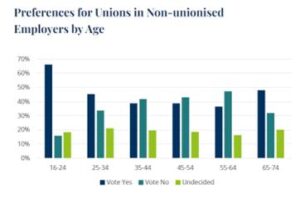Who We Are
Respect at Work is a civil society campaign fighting for legislation to improve workers’ rights.
Ireland has some of the weakest workers’ rights in Western Europe.
That means far too many people are afraid to stand up for better at work.
400,000 workers in Ireland are low paid. Many more can’t afford to cover their bills.
Working hours are getting longer, contracts are getting less secure and people are struggling.
It’s time to demand better. It’s time to demand respect at work.
If you agree, join us.
Our Demands
In the General Election campaign, we asked parties and candidates to take action.
Our campaign wants to ensure that everyone has the right to stand up for better working conditions without fear of retribution from their employer.
Workers can face victimisation or even dismissal when they try to unionise.
Laws are in place to prevent this happening in other countries and Ireland should be no different.
We asked parties and candidates to take the following pledge:
“I pledge to support legislation which promotes collective bargaining, protects workplace representatives and ensures the right to access a trade union at work.”
89 TDs have signed the pledge to date, representing a majority of the new Dáil.
FAQs
- Are workers’ rights in Ireland among the weakest in Europe?
Ireland is one of only two countries in the EU (alongside Cyprus) where there is no recognition in legislation of the need for employee representatives to have protection against dismissal.
This means that employers in Ireland can and do unfairly dismiss employee representatives for engaging in trade union activity. Workers are then left to take a case under the Unfair Dismissals Act – but, at that stage, the damage is already done and the union busting has already occurred.
There is nothing in the Unfair Dismissals Act or any other Act in Irish law to prevent an employer from dismissing a worker for their trade union activity in the workplace including participating in negotiations about terms and conditions of employment.
- Are Irish workplaces really unfair?
Yes. 1 in 5 workers in Ireland, over 420,000 people, are classified as low paid. More than 345,000 workers earn less than the Living Wage. And we work longer hours and have fewer days off than the European Union average.
- Why change the law?
As it stands, Ireland has the weakest workers’ rights in western Europe. This underpins the race to the bottom that leads to poor pay and conditions, a cost of living crisis and growing inequality. We believe that needs to change.
In 2024, a European Union directive means that the Irish Government must pass a new law about workers’ rights. This campaign is aiming for the best possible law to ensure sure every worker in Ireland is empowered to organise for the conditions that they deserve.
- Why do Irish workers need access to information in the workplace?
Ignorance isn’t bliss: any worker who wants to know their entitlements in the workplace should have the right to access that information through a trade union. But in Ireland, workers have no such right and are often denied this information by employers.
In some EU members states, for example in Italy, Spain and Germany, workers have a right to have their trade union officials visit a workplace. In Greece and Denmark, workers can have a trade union official present during inspections or to ensure safe working conditions.
None of these rights are extended to Irish workers, who are far worse off than their European counterparts.
- Will legal rights ensure better pay and conditions?
They should. Research has consistently shown that workers who are empowered to come together to negotiate on pay and conditions fare better than those who negotiate alone.
Last year, the European Commission released its annual review on the labour market and wage developments. That review recommended strengthening collective bargaining to combat the rising cost of living.
- What is “union busting” and could it effect me?
Union busting happens when employers target workers who try to demand better at work, refuse to recognise their union or deny them the right to access information about trade unions in the workplace.
As our campaign will show, many workers in Ireland are already victims of union busting – and the law can protect bad bosses who punish, demote or even sack workers who attempt to organise for better pay and conditions. That’s why it needs to be changed.
- What would this new law mean for business?
Countries such as Denmark, the Netherlands, Belgium, Finland, Austria and Sweden all have far stronger collective bargaining rights than Ireland – and they all rank ahead of us on the World Bank’s ‘ease of doing business’ rankings.
Improving workers’ rights is a path to ensuring greater stability, flexibility and innovation at work. It also allows potential disputes to be settled amicably through negotiation. And, as recent research from Spain shows, the improvement it produces in workers’ well-being leads to greater commitment and better performance.
- Would this law be good for the Irish economy
Yes. Not only would improving workers’ rights be good for workers – by tackling the scandals of low pay and insecurity – it will also help to improve Ireland’s overall productivity.
Organisations such as the OECD and IMF recognise this and support stronger collective bargaining rights in order to support greater creativity and innovation, more effective problem solving and better training processes for workers.
- What is collective bargaining and why should I care?
Collective bargaining is the process of negotiation of wages and other conditions of employment by an organised body of workers, either directly in the workplace or by sector of the economy.
It has been the norm in most European countries for decades. In Ireland, however, we lag behind. While our neighbouring countries such as Italy (97%), Austria (94%), Spain (91%), Finland, France (both 90%) and Sweden (89%) have the vast majority of their workers covered by a collective agreement, in Ireland that figure is only 34%.
This means that we are out of step with other comparable countries when it comes to negotiating pay and conditions for our workers – and that the majority of Irish workers have no collective process through which they can negotiate.
- Does the public support trade unions?
Public polling demonstrates that there is strong support for trade unions in Ireland.
A recent Ireland Thinks poll asked, ‘should employers be legally required to negotiate with their trade unions if employees wish them to do so?’ 74% said yes.

A further 64% of workers want to negotiate their pay and conditions as a group.

When it comes to support for collective bargaining, 49% have a generally positive view.

Another poll from UCD’s Geary Institute showed that 66% of young workers in non-union workplaces wanted a trade union.

